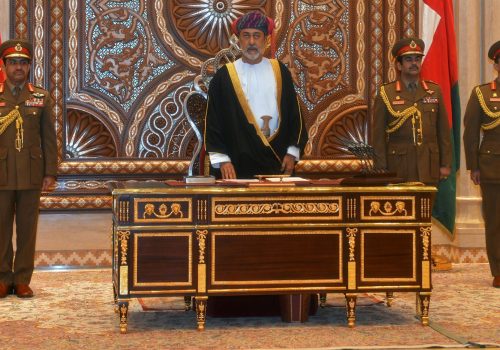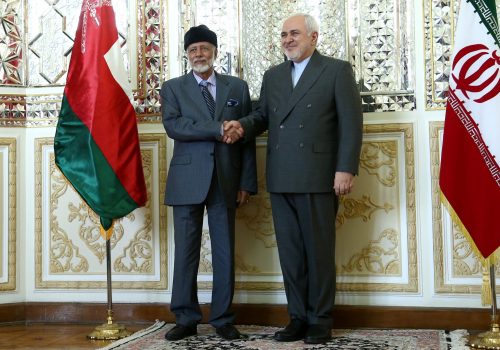Sultan Haitham makes a strong start by addressing economic challenges
Sultan Haitham bin Tariq Al Said succeeded his iconic cousin, Sultan Qaboos bin Said Al Said, as sultan of Oman on January 11. Sultan Haitham’s ascension to the throne took place amid an outpouring of domestic and international grief and condolences for the passing of Sultan Qaboos and a strong showing of Omani unity in support of the new sultan. I had the privilege of attending the first day of official condolences to the new sultan in a private capacity and was immediately struck by the diversity of the throngs of Omani mourners. Senior officials mingled with business leaders, who were joined by tribal sheikhs from Oman’s interior and a few foreign residents. Official foreign dignitaries such as former French President Nicolas Sarkozy and Qatari Emir Tamim arrived as I was leaving.
In the following days, many leading Omani business executives expressed to me their relief at the smooth transition of power and their expectation that Oman’s economy would grow rapidly as a result of Sultan Haitham’s commitment to private sector-led growth. The business community clearly looked forward to an investment-friendly environment that would propel rapid growth and urgently needed job creation while dealing with the heavy load of debt Oman had assumed over the past four years.
The private sector’s high expectations of Sultan Haitham were partly based on his role overseeing the Omani government’s Vision 2040 economic reform program. Some speculated that Sultan Qaboos assigned then-Minister of Culture and Heritage Sayyid Haitham to head the Vision 2040 project in order to help him prepare for the succession and the inevitable need to tackle Oman’s economic challenges. In his address to the nation on February 23, after paying respects to his predecessor’s achievements in building the modern Omani state, Sultan Haitham pledged to “take the necessary measures to restructure the state’s administrative apparatus” in order to “achieve good governance, performance, integrity and accountability.”
Only three weeks after this impressive speech, Sultan Haitham and his government had to contend with the dual impact of the arrival of the coronavirus pandemic and the collapse of world oil prices, which the Omani government depends upon for most of its revenue. As described in an earlier piece, Haitham responded by establishing an inter-ministerial committee to lead the country’s response. Much of Oman has been locked down since March 16, with guidance to the public to stay home as much as possible and observe social distancing and appropriate sanitary measures. Government staffing resumed at 50 percent levels on May 31 and restrictions on internal travel have now been lifted, but Oman’s international airports remain limited to air freight and periodic charter flights to allow foreign workers to return home as well as to repatriate Omanis stranded abroad. A 10 percent cut across the board to the budgets of government ministries signaled the new sultan’s intent to reduce spending and introduce greater fiscal discipline.
On June 3, Sultan Haitham signed a series of royal decrees that began to flesh out the commitments in his February speech to “restructure the state’s administrative apparatus.” Specifically, he established a Private Office (Al Maktab Al Khass) to oversee the operations of the civil ministries, reporting directly to the sultan. The Private Office will be headed by Hamad bin Saeed Al Awfi, the Minister of Agriculture and Fisheries and, significantly, also the former chairman of the National Priorities and Alignment Strategies committee for Vision 2040. The sultan also established a new Investment Authority to oversee and coordinate the operations of all of Oman’s fifty-plus state-owned companies, with the notable exception of the partly state-owned Petroleum Development Oman. The Investment Authority will also direct the operations of Oman’s sovereign wealth funds, reportedly, with instructions to refocus the majority of their investments toward projects in Oman rather than abroad, as was previously the case.
The establishment of these new institutions followed Sultan Haitham’s May 28 instructions to all government agencies by the end of this year to: end the contracts of at least 70 percent of all foreign experts and advisors; retire at least 70 percent of Omani experts and advisors with twenty-five years or more in their positions; and to retire at least 70 percent of Omani government employees with thirty years or more in their jobs.
While it is too early to know how these measures will work and their impact on government operations, it is clear that the sultan’s intent is to signal a new, more efficient administration that strives for “good governance, performance, integrity, and accountability” as he pledged in his pre-coronavirus speech. No doubt, Sultan Haitham also has in mind the urgent need to create more jobs for young Omanis and to encourage a new generation of tech-savvy Omani entrepreneurs. We should expect greater efforts to reduce government expenditures and further diversify the economy toward the private sector, with a new emphasis on raising revenue.
Good relations with neighboring Gulf states will be important. The UAE, for example, is Oman’s top trading partner and the two countries are bound by many ties of marriage, history, and commerce. But, in recent years, tensions over the war in Yemen and Oman’s insistence on the importance of maintaining channels to Iran—along with reported Emirati attempts to meddle in Oman’s internal affairs—created frictions. Sultan Haitham recently reached out to the emirs of Qatar and Kuwait and the king of Bahrain. It remains to be seen how his relations with the crown princes of the UAE and Saudi Arabia will develop. Meanwhile, Sultan Haitham can count on the goodwill of Oman’s traditional partners, the United States and the United Kingdom, as well as increasingly close ties to India. In this new era of uncertainty and fear, the United States has a huge stake in Oman’s continued stability and prosperity. Sultan Haitham is making a strong start in dealing with the economic challenges his country faces. He deserves our understanding and support.
Ambassador Marc J. Sievers is a nonresident senior fellow for Middle East Programs at the Atlantic Council. Ambassador Sievers retired in 2019 as a career member of the senior foreign service, having most recently served as US Ambassador to Oman from January 2016 until November 2019.
Image: English: Sultan Haitham seen with pictures of the Sultans of Oman and the Sultans of Zanzibar (Wikimedia Commons)


